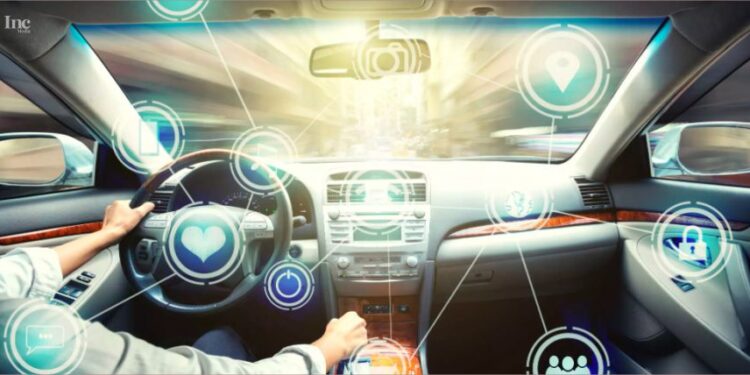Digital transformation of automobile industries has provided car manufacturers with new opportunities to enhance passengers’ safety by integrating connected car systems.
Connected vehicle technologies are becoming primary features of modern-day vehicles. It comes with various benefits that improve the passenger’s safety, increase the car’s efficiency and provide convenience to the drivers.
Smart-connected cars can offer assistance to drivers using 360-degree views. Along with that, you can access the car through your Smartphone. Electric vehicles charging, telematics, and digital car keys are some valuable features you enjoy in connected vehicles.
Real-time GPS tracking of the position of your vehicle allows you to keep an eye on the car when it is in the parking. Interaction between the driver and vehicles reduces the chances of an accident.
The car is always connected to the centralized system that keeps upgrading the surrounding environment and alerts the cars about potential objects in real time. Car’s software is designed to avoid collisions with other cars on the roads and pass through the conjunction smoothly.
1) Helpful in Road safety
One of the biggest challenges on the road is to make every driver follow the driving rules. There will be times when human errors cause severe accidents on the road.
2) Reduce car road accidents.
Several countries in Europe have implemented connected car technology. Utilizing the interconnected car system improves the drivers’ safety while assisting in understanding the driving rules.
Connected car systems interact through information exchange and ensure they are not having a close encounters with each other giving enough space for each car on the road to drive safely.
Data generated after integrating the connected car safety program indicates that it has helped reduce road accidents by more than 30%.
3) Vehicle Management
Connected car facilities help the owners of the car to manage their vehicles. It significantly reduces the maintenance cost while enhancing road safety. Also, companies with a fleet of vehicles could have complete control over their vehicles. They can track the car’s current position and maximize the business’s efficiency. A simplified mechanism tells you when to send your vehicle for servicing.
4) Data
Real-time data backing the connected car system. Every interconnected car system tracks the movement of passing vehicles, and their activities are logged in the computer system. Also, the data helps optimize the interaction between the two cars so they can drive safely at a set distance and avoid collisions.
Besides that, real-time data exchange alerts the cars in advance before they reach the accident-prone area. In case of a major accident between two vehicles, the stored data will tell us the reason behind the accident, which will later use to improve car safety.
Connected car systems unlock the full potential of the modern transportation system. Constant data processing enables the engineers to add safety features while improving the car’s performance so we can drive faster but with the highest safety features.
5) Prevention mechanism
Any unusual car engine or electronics failure could cause a road accident. Real-time data processing gives the car sufficient information to make vital decisions while on the road. Additionally, the system tracks the health of the car.
Thus, the prevention mechanism ensures you are driving a perfectly healthy car. Connected cars use various sensors placed on different components to track the system’s status.
Sensors are powerful enough to collect data and analyze vehicle health issues. Information is sent to the centralized system, where further investigation is done. A manufacturer can improve car efficiency using the data and develop a new method to avoid system failure.
Future of the Connected Cars
Connected cars are already becoming sensors in the automobile industry. Top manufacturers are integrating the new connected cars system to increase the safety and efficiency of their cars.
We are progressing towards a connected world where every vehicle will have a device that shows its real-time position. Using high-end sensors, data-driven systems, and car health maintenance software will be a game-changing technology in the modern automobile industry.
Future smart cars will have strong communication between the vehicles around them. All the cars on the road will be connected; thus, any unusual activities will be reported immediately to the car’s core system.
An emergency braking system is activated to avoid a collision between the car. Smart braking systems are faster than humans; hence, they will have better control over the vehicle.
Conclusion
Top car manufacturers already establish a research team to work on the connected car system. The progress can be seen in modern cars, where the dashboard is now more digital than traditional car systems.
Automated processing, intelligent management, and avoiding human errors are the primary objectives behind adopting the new connected car technology. We will see more cars utilizing connected cars systems in the future.















 The Inc Media is one of the most renowned global Online Business Magazines, that carries news stories about entrepreneurship, small business management, and business. Being a global business magazine, we carve for influential stories and try to take them globally to uplift the business standards and educate the people about new innovations in the business world...
The Inc Media is one of the most renowned global Online Business Magazines, that carries news stories about entrepreneurship, small business management, and business. Being a global business magazine, we carve for influential stories and try to take them globally to uplift the business standards and educate the people about new innovations in the business world...